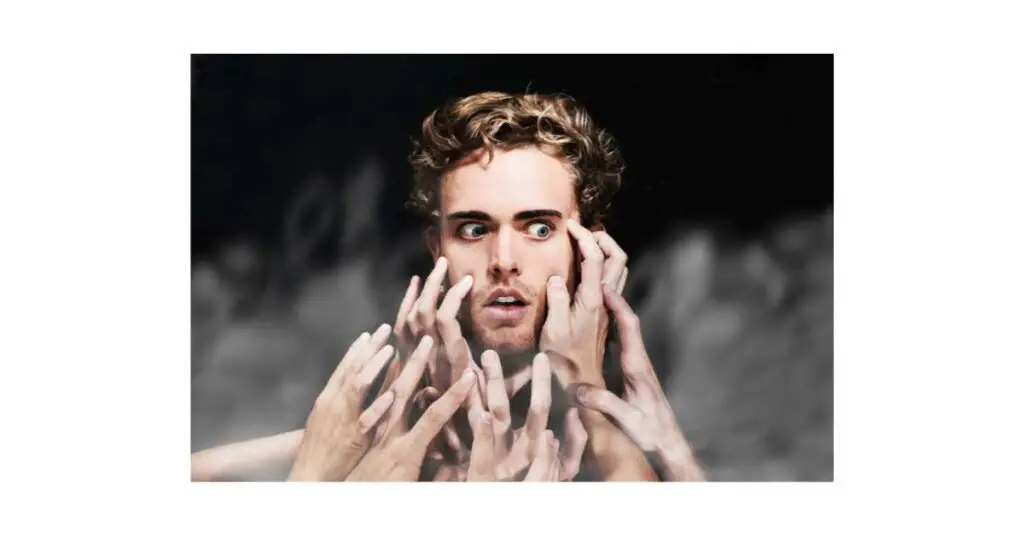Meditation is a form of mental exercise that has become increasingly popular in recent years. It involves focusing attention on one’s breathing, thoughts or feelings to increase awareness and relaxation. But can meditation cause hallucinations?
While some people report experiencing visions or hearing voices during their meditations, there is no scientific evidence to suggest that these occurrences have any physical basis. Instead, they are usually the result of intense concentration and could be considered part of the normal range for those who practice meditation regularly.
Yes, meditation can cause hallucinations in some cases. While these experiences are generally considered to be harmless, if they become frequent or intense it may be an indication of a deeper psychological issue.
It is important to consult a mental health professional if you find yourself struggling with persistent or recurring hallucinations during meditation.
In this article, we’ll explore what kinds of experiences may occur during meditation and whether they should be taken seriously as signs of something more serious than just a momentary distraction from reality.

What are hallucinations, and how can they occur during meditation?
What are hallucinations?
Hallucinations, or sensory experiences that are not based on reality, can occur during meditation. However, it is important to note that these visions, voices and other sensations are not uncommon when practicing a deeply meditative state. They are usually fleeting and considered to be harmless; however, some people find them disturbing or confusing.
What causes hallucinations during meditation?
There is no definitive answer, but there is some evidence to suggest that they may be related to shifts in consciousness caused by the practice of deep concentration and relaxation. Intense focus and relaxation can cause changes in brain activity, which may cause visual or auditory experiences that are not necessarily real.
Additionally, these perceptions could be a person’s way of dealing with suppressed emotions or thoughts while in a state of deep meditation.
It is also possible for certain hallucinogens such as psychedelic drugs to increase the likelihood of experiencing hallucinations during meditation due to their effects on consciousness.
In rare cases, hallucinations can signal the presence of psychological issues such as schizophrenia or bipolar disorder; so if you experience frequent or intense hallucinations it is important to consult a mental health professional.
Regardless of their origin, hallucinations should always be taken seriously even if they are not necessarily harmful and should be discussed with a mental health professional if they become persistent or disturbing.
Nonetheless, most people who experience these occurrences during meditation find them brief and non-threatening; they may even lead some meditators to discover new insights about themselves and the world around them.
What are the common types of hallucinations experienced during meditation?
Common types of hallucinations experienced during meditation include visual, auditory, and tactile sensations.
Visual hallucinations are the most common, and they can manifest as flashes of light or color, images of animals or people, visions of other worlds, and other phenomena that appear in the mind.
Auditory hallucinations involve hearing voices or sounds that don’t have an external source. These can be quite varied and range from music to unintelligible words.
Tactile hallucinations refer to feeling sensations on the body such as pressure or a sensation of bugs crawling on the skin.
In addition to these external-type hallucinations, some meditators report ‘inner’ experiences such as profound feelings of joy or pain, a sense of peace or well-being, out-of-body experiences, disembodied awareness, and even spiritual awakenings.
The intensity and frequency of these experiences vary from person to person. Some people may never experience any type of hallucination during meditation while others may frequently encounter them. Even if one does not experience any kind of hallucination while meditating it is possible to become more susceptible to them over time with regular practice.
Hallucinations can also be impacted by the environment – for instance, longer periods spent in darkness tend to increase the likelihood of them occurring – as well as the individual’s mental state prior to meditation. People who have been through trauma may find themselves more prone to experiencing unusual phenomena during meditation due to lingering emotions left unresolved inside their subconscious minds. Those with underlying mental health issues are also more likely to experience disturbances while meditating than those without psychological issues.
Are these hallucinations harmful or should they be taken seriously?
Hallucinations that occur during meditation can be both harmless and serious. While the majority of such experiences are brief, non-threatening, and potentially even beneficial, it is important to take them seriously if they become persistent or disturbing.
In rare cases, hallucinations can signal the presence of a mental health disorder such as schizophrenia or bipolar disorder and should be discussed with a medically-qualified professional.
Moreover, certain hallucinogenic drugs can increase the chance of experiencing unusual perceptions while meditating due to their effects on consciousness and brain activity. As such, those who have taken hallucinogens should be aware of potential risks associated with the practice of meditation, including triggering an episode or exacerbating psychological distress.
Generally speaking, people who experience hallucinations during meditation should take steps to ensure their safety and wellbeing. For example, it is recommended to practice within safe boundaries – away from noise and bright lights – in order to facilitate relaxation and minimize potential distraction.
Additionally, it may be beneficial to reduce distractions further by practicing in an environment free from mobile phones or other electronics that could cause disruption during meditation.
Finally, if one experiences recurrent or intense hallucinations it is important to seek expert advice from a qualified mental health professional who can offer appropriate guidance on how best to manage them safely without compromising one’s overall wellbeing.
Tips for dealing with unwanted hallucinations while meditating
Tips for dealing with unwanted hallucinations while meditating include understanding the causes of these experiences in order to better cope with them or prevent them from recurring. It is important to take into account both individual factors such as emotional state, lifestyle choices and underlying mental health issues, as well as environmental influences that can play a role in their occurrence.
When dealing with unwanted hallucinations, it is important to create a safe environment in which to practice meditation. This may involve finding a quiet place away from noise and bright lights, reducing distractions by turning off mobile phones or other electronics, and setting aside enough time to relax and focus on the experience of meditating. Taking deep breaths can also help one to relax and become more mindful of their internal state.
Mindfulness exercises may also be useful for those experiencing unwanted hallucinations during meditation. By focusing on the present moment without judgment or analysis, one can gradually increase awareness of sensations within the body as well as thoughts that arise without being overwhelmed by them.
In addition, integrating soothing activities into one’s practice such as self-reflection exercises or guided relaxation techniques can help calm the mind before and after each session. These activities can reduce stress levels in general and provide a better inner landscape for meditation.
When to seek professional help if you’re experiencing persistent or recurring hallucinations during meditation.
When it comes to dealing with hallucinations during meditation, it is important to be aware of potential risks associated with the practice and take steps to ensure one’s safety. If a person is experiencing persistent or recurring hallucinations while meditating, it is recommended that they seek professional advice from a qualified mental health professional.
If you are wondering if meditation can help with social anxiety, read the full blog post here.
A medical professional can provide guidance on how best to manage these experiences safely without compromising one’s overall wellbeing. They can help identify the underlying triggers for such episodes and develop appropriate strategies for managing them going forward – such as implementing lifestyle changes or incorporating mindfulness practices into one’s meditation routine.
Additionally, it may be beneficial to keep a journal of any experiences that occur during meditation which could be helpful in understanding the frequency and intensity of these episodes. This information can then be shared with healthcare providers who may need to use this data to assess the cause and severity of the hallucinations in order to offer appropriate treatment recommendations.
Furthermore, mental health professionals may recommend further assessments if they suspect an underlying psychiatric disorder may be contributing to these experiences such as schizophrenia or bipolar disorder. Such diagnoses would require medical intervention including psychotherapy, cognitive behavioral therapy (CBT), medication or other treatments depending on individual needs and circumstances.
It is also important to note that certain hallucinogenic drugs like LSD can increase the chance of experiencing unusual perceptions while meditating due to their effects on consciousness and brain activity so caution should be exercised in this regard.
Ultimately, seeking professional help when experiencing persistent or recurring hallucinations during meditation can provide much-needed support, clarity and guidance when trying to manage these episodes safely and effectively without compromising one’s overall wellbeing.
Conclusion
It is important to be aware of the potential risks associated with hallucinations during meditation and take steps to ensure one’s safety. If a person is experiencing persistent or recurring hallucinations while meditating, seeking professional help from a qualified mental health professional can provide much-needed support and guidance for managing these episodes safely and effectively.
Additionally, incorporating soothing activities into one’s practice such as self-reflection exercises or guided relaxation techniques may also reduce stress levels in general and create a better inner landscape for successful meditation experiences. Ultimately, it is essential that if any disturbing or extreme experiences occur during meditation they should be discussed with a medically qualified professional who can offer advice on how best to manage them without compromising your wellbeing.



